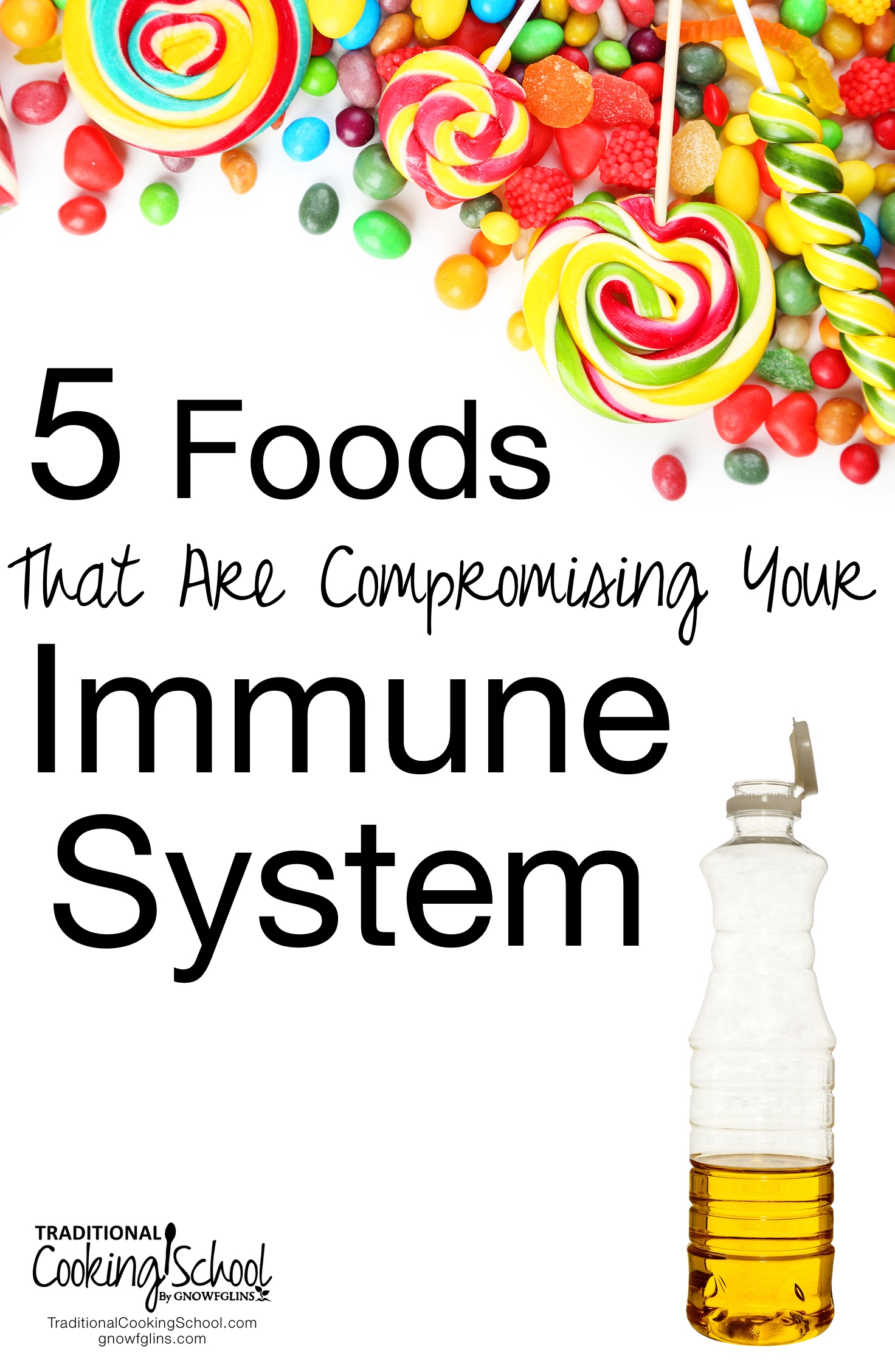
The one thing that could be hurting your immune system?
It’s not how much you exercise, although that certainly doesn’t hurt.
It’s not the supplements you take or the natural practitioner you visit — though both of these are important too.
Can you guess what that one thing is?
It’s the food you eat!
Here are the top five foods that are compromising your immune system. Avoid or eliminate these foods, and you’re sure to see a positive difference in how often you get sick or how long you stay sick.
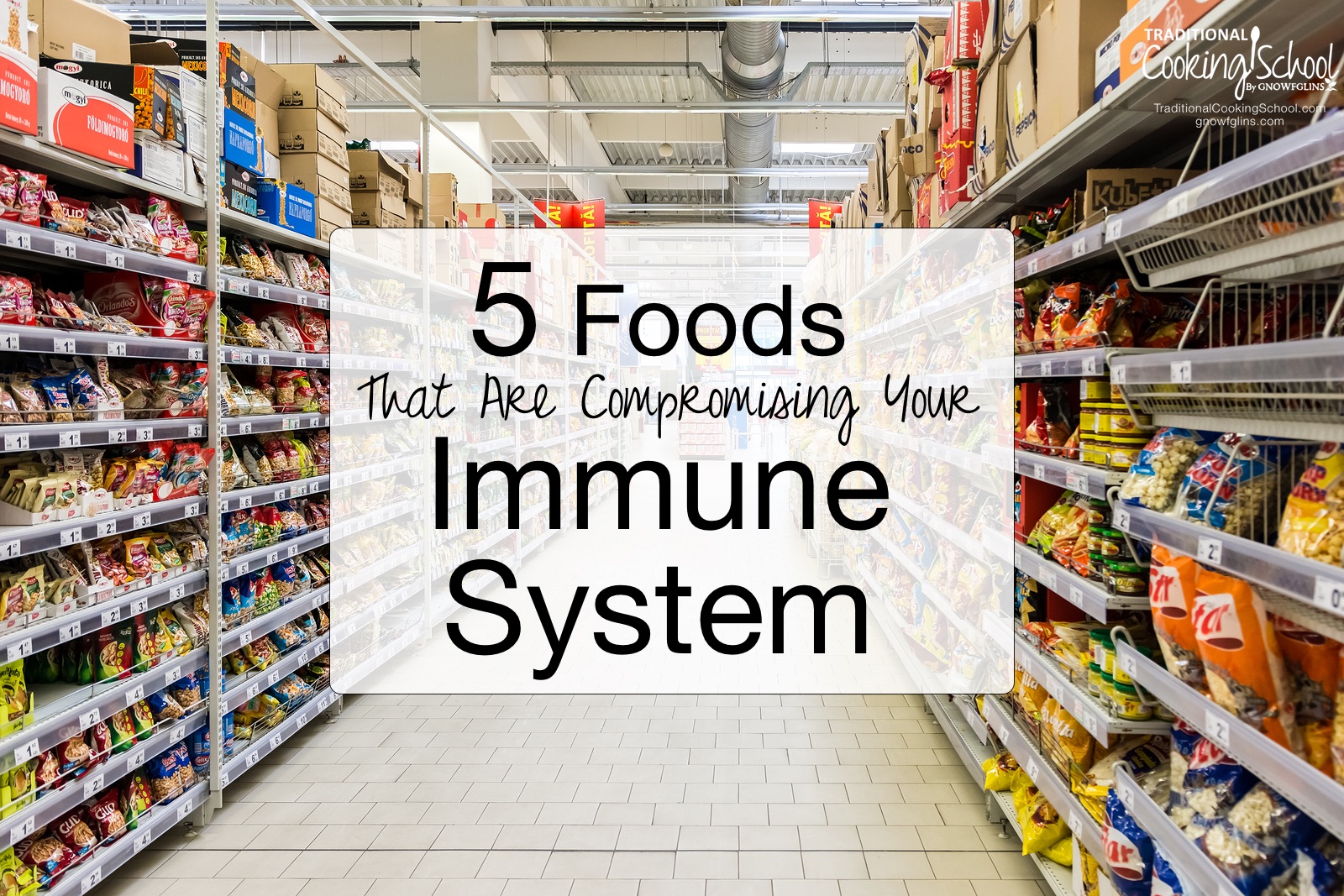
1. Processed Foods
According to trusted natural doctor, Dr. Mercola, there is one change you can make today that will lower your risk of chronic disease, help you lose weight, and make you feel happier and more energized (source).
Cut processed foods out of your life.
These denatured foods are nothing more than chemicals and empty calories. They harm, not heal, the body.
Processed foods are full of additives, genetically modified ingredients, preservatives, monosodium glutamate (MSG), synthetic and rancid vegetable oils, and more. These ingredients give them a long shelf life, but are unrecognizable to your body which perceives them to be foreign invaders.
What does the body do in response to foreign invaders? It sends powerful antibodies to fight them.
Having to constantly produce massive amounts of antibodies to battle against these foreign foods weakens the immune system over time. This makes some people more susceptible to common illnesses, such as the flu or a cold, but causes serious issues, like autoimmune disease, in others.
Avoid boxed cereals, meals in a box, frozen dinners, canned foods, store-bought sauces and dressings, and store-bought condiments.
If it has a long shelf life, you shouldn’t eat it!
Also, don’t be fooled by the words “organic” or “natural” on food packages. There are plenty of health food stores carrying “healthy” organic and natural boxed cereals, cookies, and crackers, frozen meals, and canned soups that are just as processed as anything you’d find on the shelves of your supermarket or big box store.
Action step: Buying whole foods, that don’t need a label at all, is the best and only way to avoid processed food.
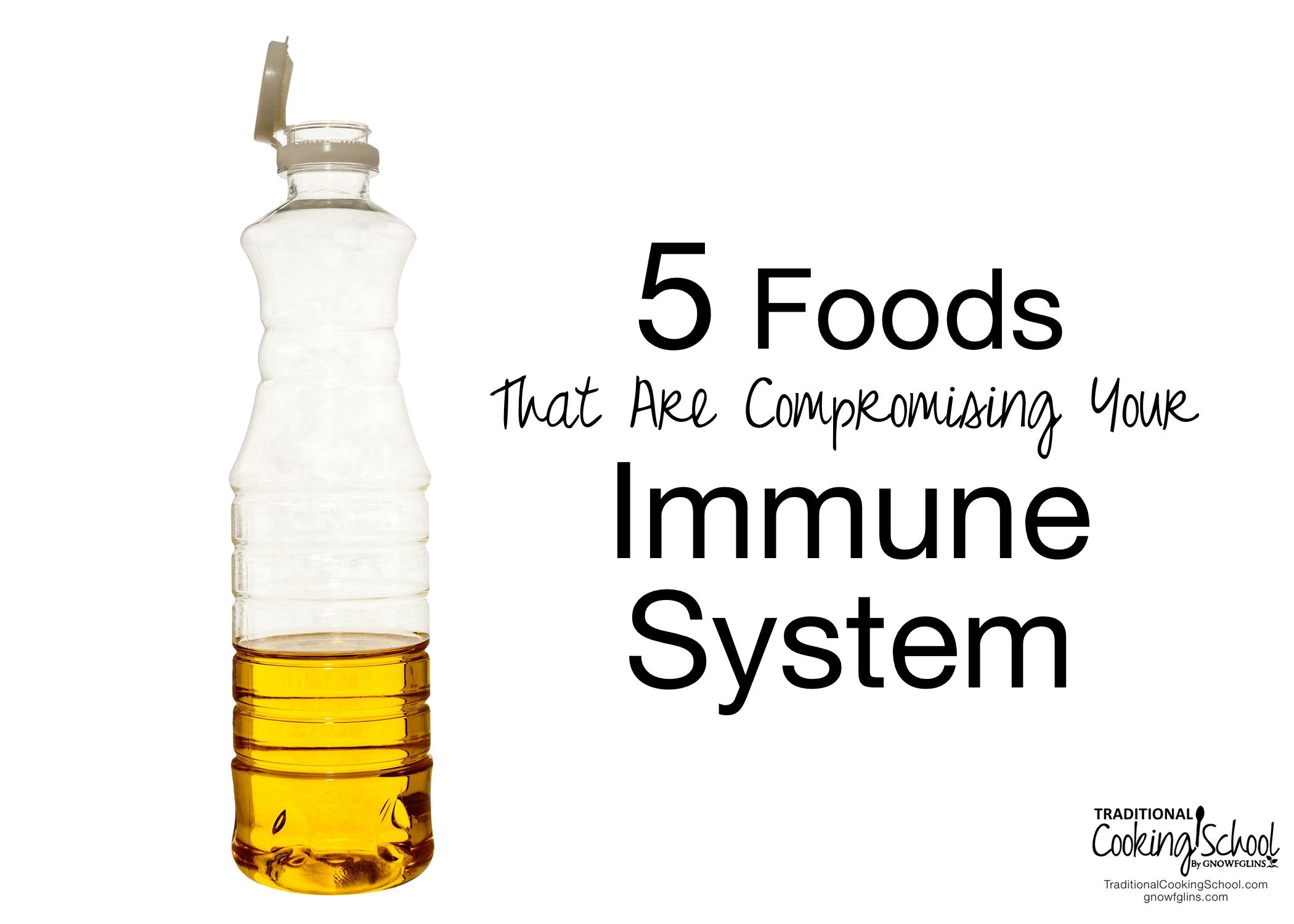
2. Vegetable Oils
Vegetable oils are highly processed, unnatural, rancid fats. They compromise the immune system because they contribute to and cause systemic inflammation. The inflammation is caused by a disproportionate ratio of Omega 3 fatty acids to Omega 6 fatty acids.
Vegetable oils are extremely high in Omega-6 fatty acids. Today, it is believed that the average American’s 6:3 ratio is 16:1. A healthy 6:3 ratio would be more like 4:1 – 1:2 (source).
Omega-3 fatty acids, found in foods like flax seeds, wild-caught salmon, pastured beef, and walnuts, promote healing and have anti-inflammatory properties (source).
Too much Omega-6 without enough Omega-3 to offset it results in harmful chain reactions throughout the entire body, including a suppressed immune system.
Dr. Ray Peat says vegetable oils can cause “acquired immunodeficiency” and weaken the immune system’s function in ways similar to the damage caused by radiation, cancer, and viral infections.
A vegetable oil emulsion, made for intravenous injection, was marketed during the later part of the 20th century specifically for the purpose of suppressing the immune system of patients who have received organ transplants.
A 1978 study showed that vegetable oils kill white blood cells (source)! The immune system needs white blood cells to do its job, so why would we want to kill them by consuming vegetable oils?
Soybean, canola (rapeseed), grapeseed, sunflower, safflower, cottonseed, and peanut oils, margarine, and any oils labeled “unsaturated” or “polyunsaturated” have no business in the body of someone who is trying to maintain a high-functioning immune system.
Action step: Stick to healthy fats like coconut oil, avocado oil, tallow, lard, ghee, and butter.
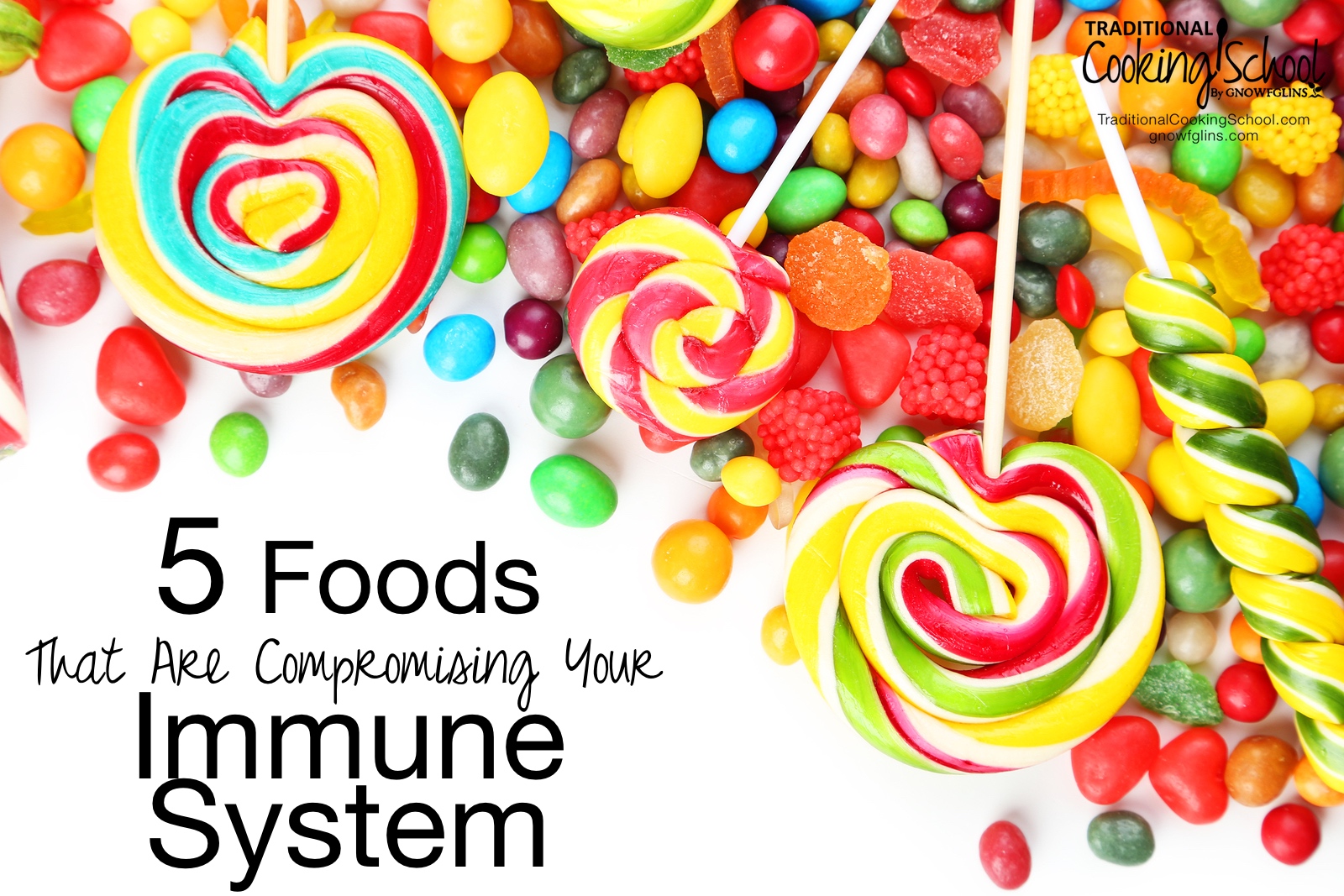
3. Sugar
Sugar literally wreaks havoc on our bodies. Here are a few ways it contributes to suppressing the immune system:
- It promotes inflammation (source). Inflammation rears its ugly head in many different forms, including weight gain, arthritis, high blood pressure, diabetes, autoimmune disease, acne and eczema, allergies, and more. An inflamed body is a body with a weak immune system.
- It feeds harmful bacteria and yeasts, such as candida albicans, in the gut. It is a well-known fact that at least 70% of the immune system is in the gut. If we are feeding the harmful bacteria and yeasts, we contribute to their overgrowth, which results in fewer beneficial bacteria and yeasts to populate the gut. These beneficial organisms are what fight off germs and pathogens. It makes sense that, if we don’t have enough of them, our immune systems are compromised and won’t be able to fight off illness when it strikes.
- Sugar feeds cancer cells (source).
While some raw honey can be very beneficial for the body, eating lots of sugary foods, including tons of fruit, is not. Here are 10 healing ways to overcome sugar addiction.
It’s far better to use whole sweeteners, such as sucanat, coconut palm sugar, and raw honey; however, baked goods and other foods that use these sweeteners should always be reserved for the occasional treat, and not something that’s consumed often.
Action steps: Significantly reduce or even eliminate sugar to boost your immune system. Avoid all sugar during times of illness because the sugar feeds the pathogens that cause illness. When you do want a sweet treat, make your own and use whole sweeteners like raw honey, maple syrup, coconut palm sugar, or sucanat.
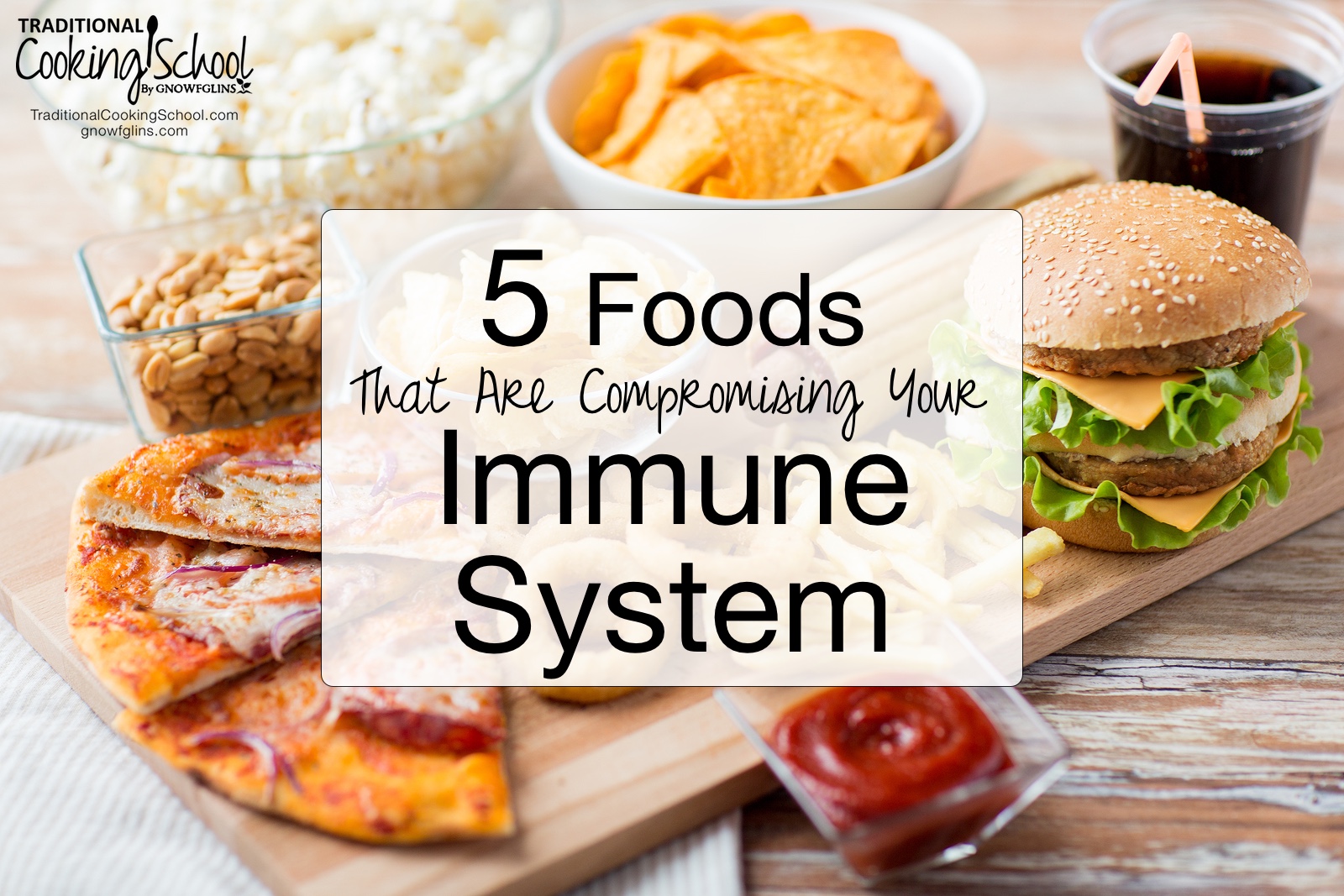
4. Restaurant Foods
Most restaurant food is nothing more than overpriced processed food. The majority of the food on a restaurant’s menu, particularly chain restaurants, arrives pre-made and frozen. It only requires the restaurant to bake, fry, or microwave it to get it to your table as quickly as possible.
Because large profit margins are the only thing most restaurants are interested in, they use the cheapest ingredients possible: factory-farmed meat and eggs, non-organic produce, commercially produced dressings and condiments, and cheap, rancid vegetable oils.
None of these foods benefit your body in any way.
Another way restaurant food compromises your immune system is through poor food storage and unsanitary preparation methods. You are twice as likely to get a food-borne illness from a restaurant than from food prepared at home (source).
This doesn’t mean you should never eat out. Eating out should be the exception and not the rule, however.
We have a couple of favorite restaurants where we always go when we eat out because they are committed to using locally sourced and organic ingredients whenever possible.
When we travel, we always search for a Chipotle if we’ll be stopping to eat. Chipotle has a storewide non-GMO policy, uses local and organic produce whenever possible, sources grass-fed meats, cheese, and sour cream, and doesn’t use soybean or canola oil in their cooking.
I believe that more and more restaurants are seeing the rise in folks demanding healthier menu choices and are starting to respond. This is promising for sure! In the meantime, avoid restaurant foods, especially chain restaurants and fast food joints. Your immune system — and your wallet — will thank you.
Action step: When you do eat out, do your research first. A quick Google search will tell you pretty quickly if there is a worthwhile restaurant near you. Use search terms like “farm to table”, “organic”, “local”, and “sustainable”.
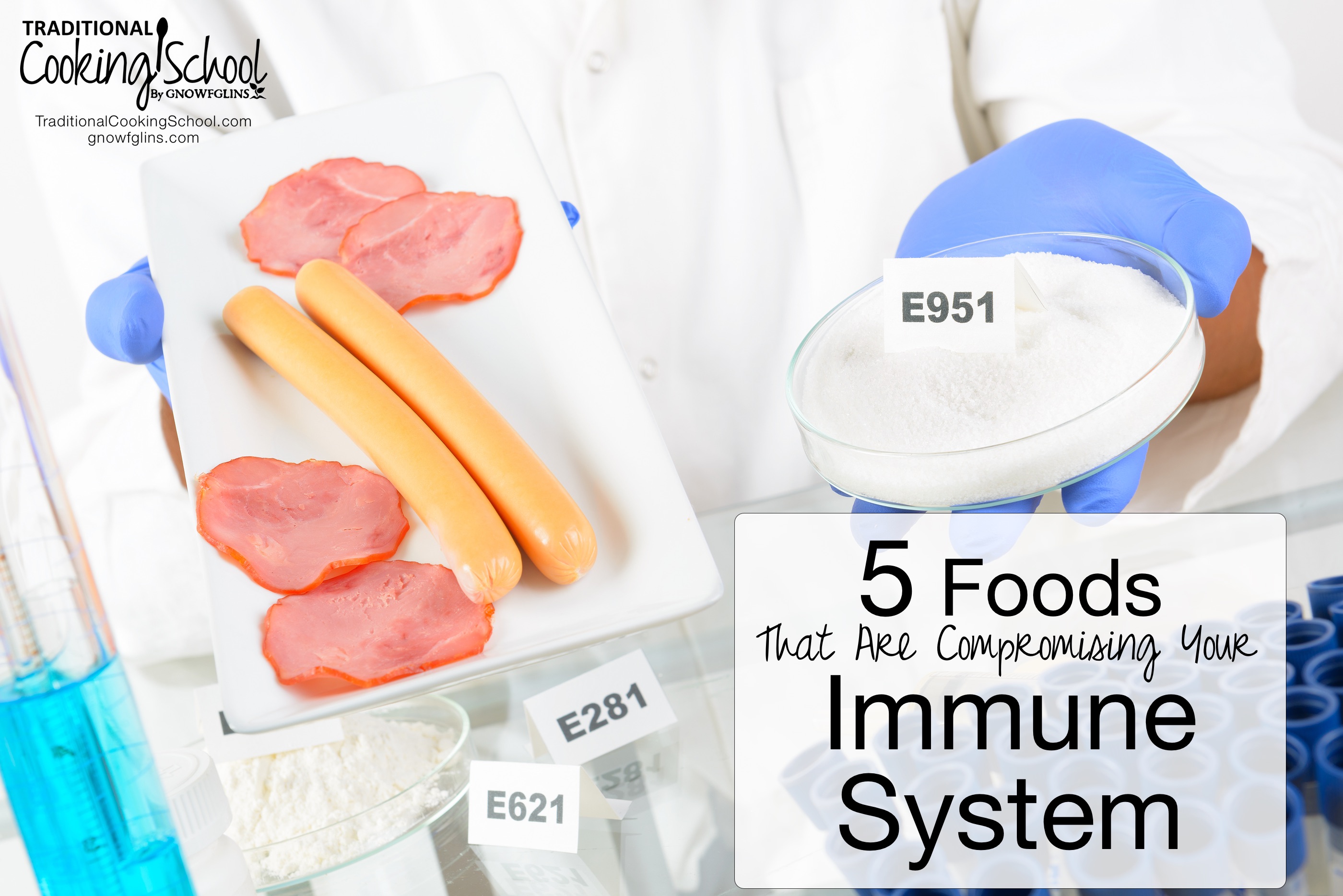
5. Artificial Ingredients
There are over 3,000 different chemicals added to our food. There have been NO studies or research to show the effects of these food additives when consumed in thousands of combinations over time (source).
Food coloring found in many processed foods can cause our bodies to develop immune responses, leading to allergies, eczema, and food intolerances. These colorings are added to processed foods, especially those for children, to make them more fun and appealing, yet their effect is anything but appealing.
There is evidence that food dyes interfere with digestive enzymes and increase intestinal permeability (source). Hello, leaky gut.
Artificial sweeteners are another ingredient that compromises immunity, mainly because it is a foreign food that your body recognizes as an invader, cannot process, and sends antibodies to attack.
Artificial sweeteners are most commonly found in diet or “lite” foods, such Yoplait yogurt, Diet Coke and all diet drinks, chewing gum, chewable vitamins, ice cream, and sugar-free foods aimed at diabetics.
When reading labels, look for aspartame, sucralose, Splenda, NutraSweet, Acesulfame-K, and others. If you’re unsure about an ingredient, don’t buy that food until you’ve researched its ingredients.
I have a personal story that shows, anecdotally anyway, the inflammatory effects of aspartame. My dad drank Diet Coke every day for years. In his late 40s, he began to notice that he was developing stiffness and aches in his hands, especially in the morning. He would have to run his hands under hot water every morning in order to move his fingers without pain.
Somehow he came to the conclusion that his Diet Coke habit was to blame for this early arthritis, so he stopped drinking them. Within a few days, the stiffness in his hands diminished. He was able to move his fingers freely, without running them under hot water first.
Without a doubt, there is a direct connection between artificial sweeteners and systemic inflammation. Who knows how much pain he would be in now in his 50s if he had not made that connection and continued to drink poison.
Artificial flavorings are another chemical additive to food that is compromising your immune system.
Because processed food is so denatured, it doesn’t taste like food anymore. So fake lemon, orange, vanilla, or berry flavors have to be added in to mask the fact that no actual lemons, oranges, vanilla, or berries were used to manufacture the food and the fact that the food would taste awful without these flavorings.
These substances are unrecognizable, without nutrient value, and trick our brains into thinking they taste better than whole foods. Even if these artificial ingredients weren’t proven to be harmful — which they are — eating them in any quantity compromises immunity because the more fake foods you eat, the less whole foods make it into your body.
Action step: Carefully read labels on any pre-packaged food you buy or eat. If you don’t recognize an ingredient or can’t pronounce it, it’s best to avoid that food and reach for something you can recognize without a Ph.D. in chemistry.
It is the whole foods — vegetables, pastured meats and eggs, healthy fats, traditionally prepared grains, nuts, and beans, and raw dairy products — that energize, strengthen, and heal your body. No manufactured, “enriched”, flavored food can do for us what Real Food does.
What you’re eating every day is either strengthening your body’s defenses against sickness and disease or it’s compromising those defenses. Eat wisely!
Do you regularly eat any of these foods? Do you think reducing or eliminating them from your lifestyle could have a positive impact on your immune system and overall health?
This post was featured in 82 Ways To Heal Your Gut.
More Posts You May Enjoy
We only recommend products and services we wholeheartedly endorse. This post may contain special links through which we earn a small commission if you make a purchase (though your price is the same).


I am interested in learning more about eating better. Thank you.
Nicely written! I have MS and my husband and I began eating healthier. We strive for a plant based diet with our own eggs, grass fed chicken and fish. My husband lost over a hundred pounds just eating healthy and exercising regularly. He is now off all insulin, high blood pressure medication and High Cholesterol medication! The doctors are thrilled with his difference. Of course, being a female of age and having some mobility issues from the MS, it is taking me a little more time. I am, however, very happy to report that I am feeling so much better! My gut has had issues for years and probably contributed to the MS which is inflammation. Getting rid of wheat and most gluten also helped me.
How wonderful, Deborah! I’m so happy that you and your husband have experienced first-hand how healing good foods can be!
Great list! I used to get colds all the time but since going gluten-free and having to make EVERYTHING from scratch (I’ve always done a lot of homemade, but used to buy one or two things just for convenience) I haven’t had a cold once.
I know! We rarely get sick either! It’s amazing how that happens!
Nice to have a clear and concise list, thankyou. Have nearly eradicated processed foods from my grocery list. I purchased lite bottled dressing yesterday and realize that it’s the one thing I have never even tried to get in the habit if making. Artificial sweeteners have increased since my diagnosis of diabetes in the form of flavored syrups for an iced coffee, hard candies and the occasional soda. Before that I was using natural sugars because I know the alternatives are bad. My nutritionist says,”well it very well could be bad for your health but the alternatives are worse and sooner to happen”. I’m in conflict mode. Was also told to get rid of my real butter because it’s terrible for me, yesterday for the first time in ages I bought I Can’t Believe It’s Not Butter. I don’t want to eat it, IT DOESNT TASTE LIKE REAL BUTTER. They seem to be telling me that I need to put more fake food inside me to live longer and feel better which goes against all the studying I’ve done and changes I’ve made over last ten years. I appreciate your list and will hang on to it. And I will have to find a balance between my education and theirs.
Cynthia, I hope you’ll listen to your gut on this! If you don’t feel right about eating it, you probably shouldn’t, especially I Can’t Believe It’s Not Butter. Nourishing foods are how to turn your health around, not fake ones. Blessings to you!
I enjoy using Yacon syrup and powder in place of other sweeteners. It has a glycemic index of 1, so ideal for diabetics and primarily consists of inulin and FOS which feed your beneficial bacteria. The only problem is that it is expensive because it is marketed for weight loss. But if you consider sweets a special occasion food, then the price isn’t such a problem.
It always saddens me how many people don’t realize these things. It’s hard to sit back and watch people eat things you know that are not helping them heal when they don’t want advice.
It can be frustrating, can’t it…. 😉
Please add Olive Oil as a healthy oil. The Ex-virgin has tremendous healing properties.since I’ve had a gall bladder issue the Olive Oil is the only oil I consume. I actually feel better when I do use it and miss it when I do not!
I would like to know if you have a list, or a link to the list of chemicals that are regularly added to our foods. Also, my sister told me that there is an app that allows you to scan the barcode on a product and it will tell you exactly what is in the ‘natural flavor’ category on that product.
Either of these would be of great help to my friends and myself.
Thank you,
Martha
Hi Martha! Great questions!
Regarding smart phone apps to scan barcodes, the only one I have personal experience with is Fooducate. However, I found this list of 7 smart phone bar code scanners that you might find helpful: http://www.iphoneness.com/iphone-apps/awesome-food-barcode-scanners/
In the article, I give this list of artificial sweeteners: http://www.doctoroz.com/article/list-names-artificial-sweeteners
Unfortunately, there are so many thousands of chemicals added to foods that I’m not sure there is a comprehensive list out there. And there are new chemicals being invented all the time, so even if a list existed, it would most likely be obsolete after a few weeks. Is any of that helpful?
Perhaps you could suggest another restaurant; while traveling, than … Chipotle, with all the food related illness attributed to them in the last few months… another recommendation would be appreciated
Panera is another chain that is making a commitment to get rid of high fructose corn syrup and GMOs. Jason’s Deli has some good options too, including gluten-free choices, some organic produce on the salad bar, hormone-free chicken, and wild salmon. The only other recommendation I have is to find a Whole Foods or Central Market and eat from their hot and cold food bars. Both stores have a variety of options for meats, salads, dips like guac, hummus, and salsas, and fresh-pressed juices. If we are traveling and know none of these places are on our way, we pack food and eat in the car. Hope that helps!
I also meant to ask your opinion on olive oil ……
as a nurse I wholeheartedly agree with the sugar, over processed [ or processed foods ], artificial ingredients, et all ….trying to get husband & myself to eat healthier [for the most part we do, but succumb to junk too often] & get patients to change a life time of certain foods & habits for a healthier future is not as easy at all…. I know one of my worst habits was/is diet coke… I am again going to switch to a fruit shrub [ made with honey not sugar] yet again… I had kicked the diet coke habit for over a year & allowed myself to relapse…….. sigh… but will succeed! Thanks for this article… informative without being preachy, intend to share…
I believe that TRUE olive oil is a very healthy and Traditional fat. You have to beware of most olive oils sold in the U.S. Many brands have been outed as cutting their olive oil with cheaper oils for bigger profit margins. Chaffin Family Orchards is a reputable company that makes a beautiful olive oil. I don’t like cooking with olive oil, however. So I use it raw in things like salad dressing and pesto.
What do you think about Palm Oil? I buy it from Tropical Traditions for deep frying.
Joy ~ I think it’s great!
I’m sure some peanut oil should be lumped into the ‘bad’ category, if it is extracted by chemicals, but peanut oil is easily extracted from peanuts by simply grinding them (with a little water as described by Dr. Mercola here: http://articles.mercola.com/herbal-oils/peanut-oil.aspx) and letting it sit. The oil will naturally separate. Certainly, the balance of omega 3 and 6 is still an issue with peanut oil, but it can be a healthy oil to use in some situations.
Hello! Nice article. You mentioned that “sugar feeds on cancer” but I think it’s the other way around. I’m sure your readers knew what you were saying though! 🙂